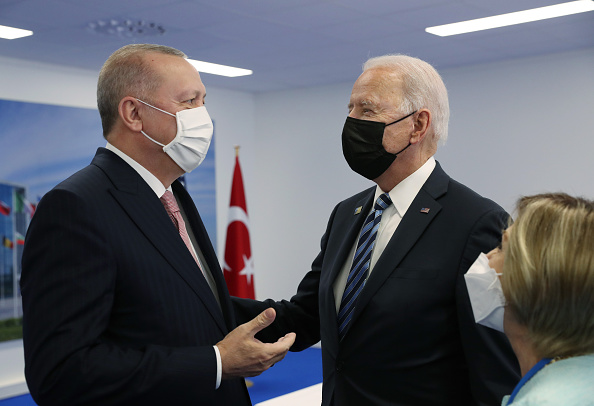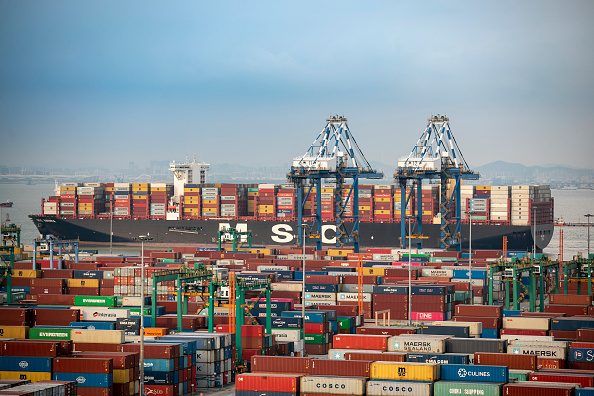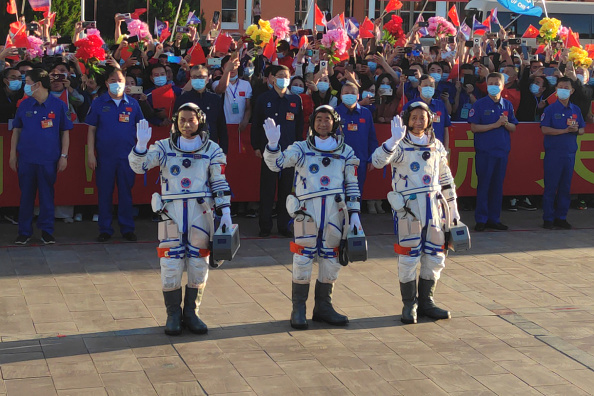
 Part of the Club
Part of the ClubG7 leaders delivered their toughest criticism of China in recent years, calling on Beijing to respect human rights, urging further investigations into the origins of the Covid-19 virus, and pledging to create an alternative to Beijing's Belt and Road Initiative. At the same time, the final communiqué also called for cooperation on shared global challenges, primarily climate change and biodiversity loss. This was President Biden's first G7 as President, and the group's first meeting since 2019.
Although the summit concluded without concrete details on funding and timelines, the members created a firm front for confronting China, one of Biden's clear goals from the beginning of his presidency. "It is great to have a U.S. president who's part of the club and very willing to cooperate," President Emmanuel Macron of France said after meeting with the U.S. President.
Only a few days after the G7 meeting, all thirty NATO members convened in Brussels, highlighting the military challenges presented by China. In the alliance's joint communiqué, China and Russia were listed as top security threats, citing both countries' military buildup and cyberterrorism. Taking a softer tone than the G7, the NATO meeting cast their differences with China as "challenges" that should not be overblown. NATO secretary-general, Jens Stoltenberg, said "China is not our adversary, but the balance of power is shifting...We see them in cyberspace, we see China in Africa, but we also see China investing heavily in our own critical infrastructure."
In response, China's mission to the EU condemned NATO for promoting the "China threat theory" after the meeting concluded, writing "we will not pose a 'systemic challenge' to anyone, but if anyone wants to pose a 'systemic challenge' to us, we will not remain indifferent." Read more on the U.S.'s international engagement in Caught Between China and the U.S. - How Will President Biden Re-Engage With Europe?, from Leonardo Dinic.
 Heavy Metals
Heavy MetalsIn an effort to curb inflation, China has started selling off industrial metals from state reserves in order to tame surging manufacturing prices. Beijing's massive sell-offs include copper, zinc, aluminum, and other metals. The move came in response to accelerating factory prices, which shot up at the quickest pace in over a decade between April and May. China, which in 2019 was the third largest exporter of metals in the world, also purchases nearly half of the world's refined copper. Any major shifts in the second-largest economy's metal market are sure to stoke fears of global inflation. But China's Vice Premier Liu He emphasized the need to control commodity prices in order to bring greater stability to the overall economy.
Meanwhile, China's factory output continues to slow, partially due to recent Covid-19 outbreaks in Southern China. The outbreaks are impacting global trade with a shipping backlog that is expected to last for months. After a container port north of Hong Kong shut down for a week in May, ports throughout Guangdong and Shenzhen faced additional congestion. The backlog is adding disruption to the world's shipping industry and global supply chain, and significantly increasing shipping costs from the East to the West.
 Meteoric Ascent
Meteoric AscentThis week China landed 3 astronauts on the Tianhe Space Station, a first for Chinese space exploration. The 3 astronauts will live in the Tianhe for 3 months, a major milestone for a nation that first sent a spacecraft into orbit in 2003.
China's meteoric ascent in space travel comes despite a U.S. ban on participating in NASA-led projects. U.S. Congress took action in 2011 to regulate NASA's contact with China, effectively barring them from initiatives like the International Space Station. This first mission is part of eleven planned missions during the space station's construction phase — two more modules and several more cargo and crewed missions need to be completed before the space station is finished in 2022.
The U.S. has been watching China's rapid space development for some time. In 2019 Vice President Mike Pence declared that the U.S. and China were in a "space race", and just last month, the U.S. Senate passed the Innovation and Competition Act (USICA), which will deliver $10B in funding to NASA if approved by the House and signed into law by President Biden, who supports the bill. In the past, STEM development has been publicly touted by U.S. politicians as a vector for economic stimulation and job creation, but the USICA has been marketed as a tool for remaining competitive with China, a sign that U.S. policymakers see countering China as a topic that has broad public support.
Prepared by China-US Focus editorial teams in Hong Kong and New York, this weekly newsletter offers you snap shots of latest trends and developments emerging from China every week, while adding a dose of historical perspective.
- 2021-06-11 Retaliatory Legislation
- 2021-06-04 "Defanging" Diplomacy
- 2021-05-28 The End of an Era?
- 2021-05-21 One Step Forward, One Step Back
- 2021-05-14 Drifting Trade Ties
- 2021-05-07 Time to Talk
- 2021-04-30 Academic Pandemic
- 2021-04-23 Carbon Cutting
- 2021-04-16 A Hopeful Climate
- 2021-04-09 Technological Frontiers
- 2021-04-02 Back to Basics
- 2021-03-26 The Biden Era
- 2021-03-19 “A Strong Smell of Gunpowder and Drama”
- 2021-03-12 Bridging the Divide
- 2021-03-05 A Tale of Two AI Superpowers
- 2021-02-26 Changing of the Guard
- 2021-02-20 Collective Approaches
- 2021-02-13 Hopes for a Bullish Year
- 2021-02-05 “The Most Serious Competitor”
- 2021-01-29 Looking Towards Multilateralism
